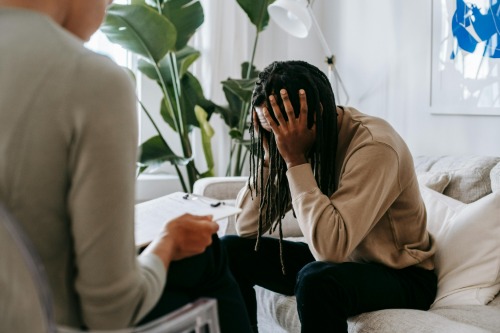It’s no secret that being Black in America comes with unique challenges. Whether it’s navigating systemic inequities, dealing with microaggressions, or witnessing the constant flood of traumatic news, the weight of it all can be overwhelming. For Black folks, prioritizing mental health and embracing self-care isn’t just a trendy hashtag—it’s a necessity for survival and thriving.
Let’s explore why self-care is essential, the unique mental health challenges the Black community faces, and some actionable ways to incorporate self-care into daily life.
The Weight We Carry: Unique Mental Health Challenges for Black Americans

Imagine walking into a room where everyone else questions your abilities, not because of your skills, but because of your skin color. Now imagine this happening daily. That’s just the tip of the iceberg for many Black Americans.
Historically, the Black community has been disproportionately affected by mental health challenges, but the stigma surrounding therapy and mental health conversations often silences people who need support. According to the American Psychological Association, Black adults are more likely to experience severe psychological distress compared to their white counterparts but are less likely to seek professional help. Why?
It’s a mix of cultural factors, mistrust of the healthcare system, and limited access to affordable resources. On top of that, racial trauma—triggered by discrimination, police brutality, and even witnessing such events online—adds another layer of stress that other communities might not face at the same intensity.
And let’s not forget the mental toll of representation fatigue. Whether you’re the “only one” in your workplace, school, or social circle, the pressure to excel, educate others, and combat stereotypes can leave you emotionally drained.
Self-Care Isn’t Selfish: Why We Need It Now More Than Ever

For generations, the Black community has been taught to “push through.” Resilience is woven into the fabric of our culture. But here’s the truth: resilience without rest isn’t sustainable. Self-care is more than bubble baths and spa days; it’s about prioritizing your well-being so you can show up as your best self in every aspect of your life.
The pandemic highlighted the urgent need for self-care. Black Americans faced higher rates of COVID-19 deaths, financial instability, and unemployment—all of which contributed to heightened anxiety and depression. Add to that the 24/7 news cycle replaying incidents of police violence and racial injustice, and you’ve got a recipe for burnout.
Taking care of yourself doesn’t mean you’re ignoring the world’s problems. In fact, it’s the opposite. When you prioritize your mental health, you equip yourself to fight for change with a clearer mind and fuller heart. Think of self-care as charging your phone. You can’t make calls, send texts, or use your GPS if your battery is dead. The same goes for your energy. If you’re drained, you can’t show up for the people or causes you care about.
Actionable Steps: How Black People Can Embrace Self-Care

So, how can we, as Black folks, make self-care a priority? Here are some tangible ways to protect your mental health and build a self-care routine that works for you.
1. Break the Stigma Around Therapy
Let’s start with the big one: therapy. It’s time to normalize seeking professional help. Therapy isn’t about being “broken”; it’s about building tools to manage life’s challenges. If traditional therapy feels inaccessible or intimidating, look into community-based organizations that provide culturally competent mental health services. There are also online platforms like Therapy for Black Girls and Therapy for Black Men that connect you with therapists who understand your experiences.
2. Set Boundaries and Learn to Say No
Whether it’s at work, with family, or in friendships, setting boundaries is a form of self-care. It’s okay to say no to that extra project or skip that family gathering if it’s going to drain your energy. Remember, your time and mental health are valuable.
3. Unplug From the Trauma Cycle
Scrolling through social media or watching the news can quickly become overwhelming, especially when it feels like Black pain is constantly on display. Give yourself permission to unplug. Turn off notifications, set limits on your screen time, or curate your feed to focus on content that uplifts and inspires you.
4. Lean Into Joy
Joy is a revolutionary act. Spend time doing things that make you happy, whether that’s dancing to your favorite playlist, binge-watching a hilarious show, or creating art. Surround yourself with people who bring positivity into your life and celebrate your wins, no matter how small.
5. Practice Rest
Rest is resistance in a culture that glorifies overworking. Make sleep a priority, schedule breaks in your day, and don’t feel guilty for resting. As Audre Lorde said, “Caring for myself is not self-indulgence, it is self-preservation, and that is an act of political warfare.”
6. Reconnect With Your Community
Community care is just as important as self-care. Whether it’s joining a local Black-owned gym, attending cultural events, or simply calling up a friend to chat, staying connected to others who understand your experiences can be incredibly healing.
7. Advocate for Systemic Change
Lastly, self-care also includes advocating for systems that support mental health. Push for better access to mental health resources in schools and workplaces, and support policies that address racial disparities in healthcare. Advocacy, while demanding, can be empowering and affirming when done in balance.
